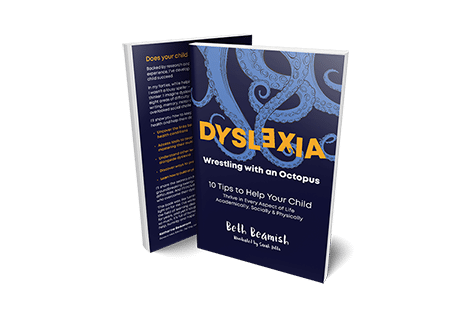
How Going Gluten-Free Transformed our Home
Hi, I’m Melissa, Beth asked me to explain how going gluten-free made a difference in our household. I have a

The book itself is written in a style that all of us can relate to. It has the feel of one mum giving another mum advice at the school gate. At times the book is literally written like this (the mother getting advice is called Diane). As a result, this book doesn’t read like dry academia – although there has been a substantial amount of research go into it – rather it reads like a story.
It is the story of a family trying to find out why their child is struggling with specific aspects of life, finding answers both helpful and unhelpful, and then trying to find solutions and strategies which actually work for a young person moving through the world with dyslexia.
The book is broken into eight chapters which are all practical and engaging. Each section provides insight into specific aspects of dyslexia. It covers things like the holistic impact of dyslexia, the learning challenges associated with dyslexia and how to tackle them, common overlapping learning difficulties, a strengths-based approach to dyslexia and way more.
I found myself reading the book and reflecting a lot on my childhood and my adult life. I have never been diagnosed with any sort of learning difficulty, but I am pretty sure that every teacher I ever had diagnosed me as either ADHD or “the naughty kid”. Either way, they seemed to learn my name pretty quickly to tell me to be quiet and concentrate. As I read through this book, I noticed so many familiar experiences. I have always felt different, but there was something unique about reading someone else put into words experiences that you have had, which you also thought no one else has had.
For that reason alone, I would recommend this book to anyone who ever had a tough experience at school. However, even if you are not like me and you don’t have some undiagnosed learning difficulty, I would still recommend this book.
Like Harper Lee wrote in To Kill a Mockingbird “You never really understand a person until you consider things from his point of view… Until you climb inside of his skin and walk around in it.”



Hi, I’m Beth. Seven years ago, when I discovered my son had dyslexia, I had a ‘light-bulb’ moment and understood this explained many of my own difficulties. Ever since, I’ve been on a mission to discover the best ways to wrestle what I like to call the dyslexia octopus.

Hi, I’m Melissa, Beth asked me to explain how going gluten-free made a difference in our household. I have a

I need nighttime anxiety relief. It’s 4 AM, and I’m reviewing what happened to Harry at school yesterday and wondering